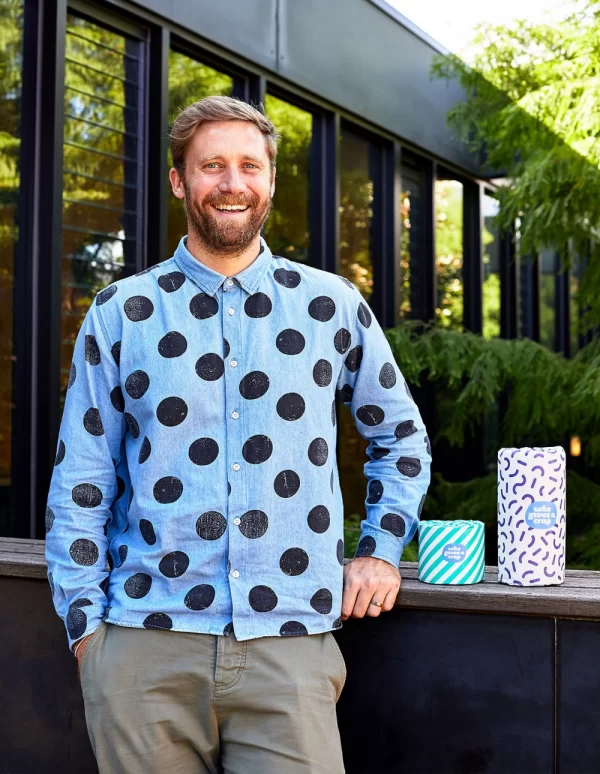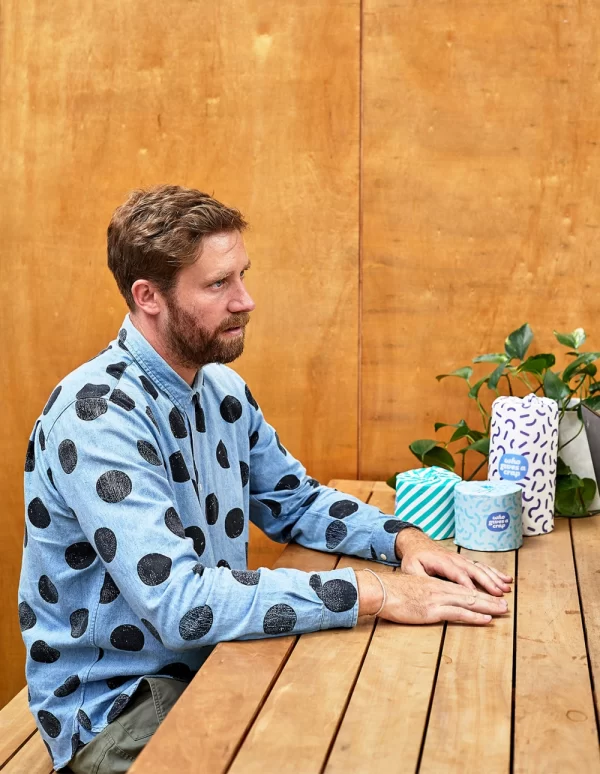
The making of a for-purpose business with Who Gives a Crap co-founder Simon Griffiths
- Culture
The story of a profit-for-purpose toilet paper company
Simon Griffiths’s passion for adequate sanitation for everyone
By Jenny Ringland
Did you know that roughly 40 per cent of the world’s population do not have access to adequate sanitation like toilets and water? When Simon Griffiths discovered this fact in 2012 he co-founded plastic free, profit-for-purpose toilet paper company Who Gives A Crap.
In the almost 10 years since the company started making toilet paper, the certified B Corp company has donated over $A 10million to help build toilets and provide clean water around the world. Their mission is to donate 50 per cent of profits to ensure everyone has access to clean water and a toilet within their lifetime.
“When we founded Who Gives A Crap back in 2012 there weren’t many purpose led businesses at the time. That’s changed a lot in the last decade, and now there’s a lot of demand for companies to make a positive impact from the work they are doing,’’ Simon says.
“The success we are seeing in our business model shows that people are supporting ethical choices with the products they buy and really want to help make the world a better place.”
March 2020 saw the kind of growth no expert could have predicted, and while most of us were grappling with the uncertainty of a pandemic, Who Gives A Crap was tackling unprecedented and mind boggling sales.
“On the first day of March our daily sales doubled and at our peak we were selling 28 rolls of toilet paper every second,’’ Simon recalls.
“We had to pause for a moment, so we could ensure we had enough product for our subscribers and business customers. We amassed half a million sign ups on our waitlist but got through them eventually!”


What does it take to found a for purpose business?
Founding a for purpose business doesn’t just happen after an aha moment, Simon grew up thinking about social issues and the environment thanks to his parents who he says “think quite deeply about how they spend their time and money.’’
“My interest has definitely strengthened over time, especially with climate change knocking on our doors and I’ve started to think about what kind of impact and world I want to leave for our future generations,’’ he says.’’
“I often take influence from the things that I think can be improved. At the start of my career, I worked at a large oil and gas company as an engineer, and then as an investment banker at a global bank. I learnt a lot about the importance of purpose, culture and work life balance that has fed into what Who Gives A Crap is today.”
Following Australia’s federal election in which stronger action on climate change was voted in, there is a feeling of hope for the first time in a long time.
“Business decisions are driven by consumer demand, so if more people make conscious switches to products that are more sustainable, companies have to listen and make changes to how they operate,’’ Simon says.
“We’re seeing this play out in personal care at the moment – refill stations are starting to pop up in major supermarkets, when previously they were only in zero-waste and bulk stores. This shift is happening because enough consumers voted with their dollars, which made supermarkets realise they had to make changes to their offering to keep customers coming into their stores.”
But all change isn’t created equal and Simon believes it’s not just up to individuals to affect change, it needs to cross over into all sectors, from grassroots organisations to finance, business and government.
“It is the responsibility of individuals, corporations, and governments to work together to curb the climate crisis,’’ Simon says.
“As a collective, we have the power to challenge industry, and demand a positive impact on the environment and drive climate action.”
Why toilet paper?
Which begs the question, why toilet paper? How could starting a company that makes loo rolls make a significant difference?
“Many people massively underestimate the impact traditional toilet paper production has on the planet. If all toilet paper was made from bamboo fibres or recycled material, instead of virgin wood pulp, we could save more than 700 million trees from being cut down each year,’’ Simon says.
“This would have a crucial environmental impact as 25 per cent of global carbon emissions are sequestered by forests, farms and grasslands.
“Deforestation is affecting half the world’s land surface and as a direct consequence, millions of species are losing their natural habitat and being displaced to lower quality environments. Some estimates suggest we are losing up to 137 species (of animals, plants, insects) everyday.”
The making of a sustainable business
Simon acknowledges even the term sustainability can now have greenwashing connotations thanks to overuse and mis-use, and that to be a truly sustainable business requires a dedication to accountability.
“To be truly sustainable is to always be looking for solutions to do better,’’ he says.
“The thing about sustainability is there’s a lot of nuance and layers to it. For some businesses, there are simple things they can do within their supply chain like optimising packaging or products that are more sustainable for their customers or teams. For other organisations it is more nuanced.”
Who Gives A Crap uses no plastic packaging, uses carbon neutral shipping, with a long term goal of being carbon negative, via reducing emissions and offsetting what it can’t reduce.
“We are also looking carefully at the sources of energy for our factories and warehouses, aiming to use renewable energy as the input or generating energy on site. We’ve already partnered with some of our factories and warehouses to install solar on site and we’ll have more exciting initiatives to share soon.’’
RELATED: Why the future of fashion is First Nation’s
RELATED: 5 creative activists to watch
